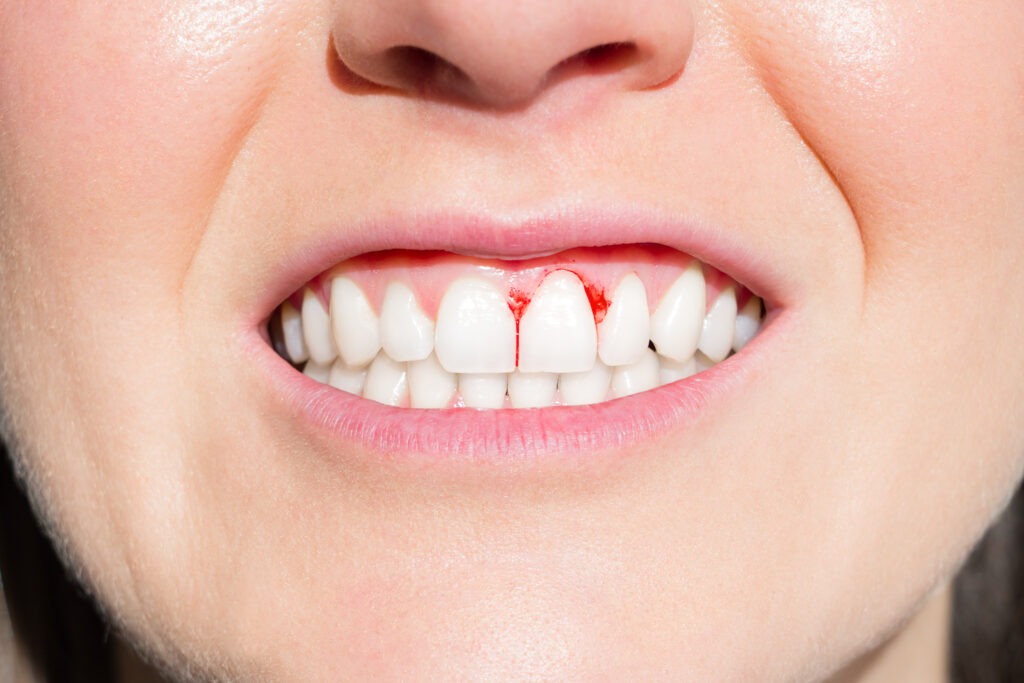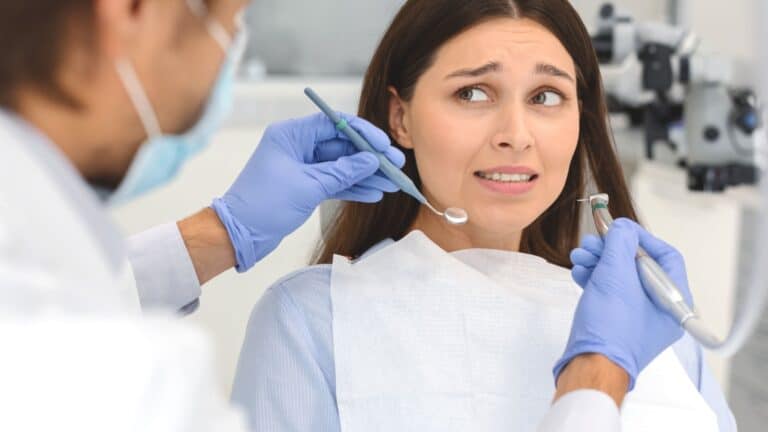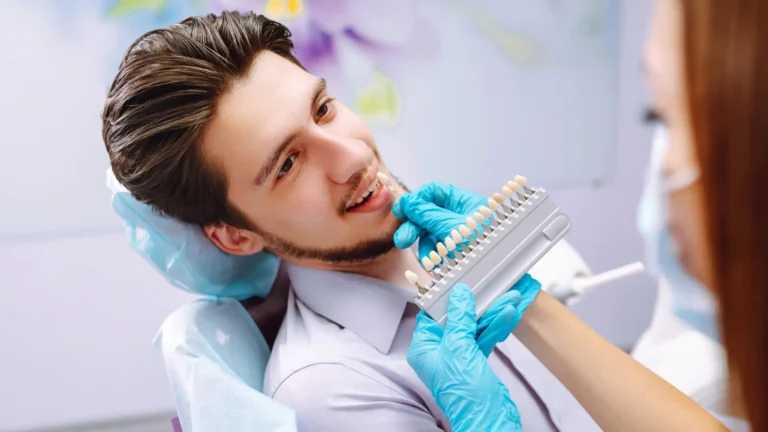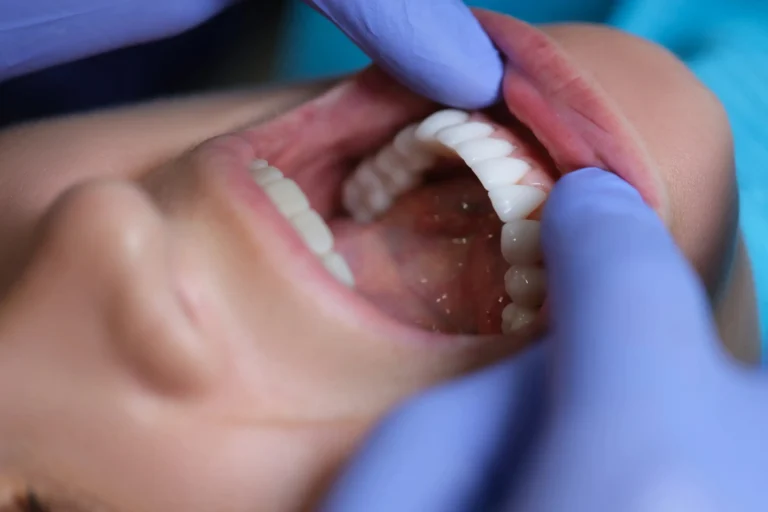
If you’re brushing your teeth and notice blood spots on your toothbrush or mixed in with the toothpaste you spit out, it might cause you to worry. You may also find blood when you’re biting into something.
The most common explanation for this is that you have bleeding gums. While it is a common problem, bleeding gums shouldn’t be ignored. A few painless splashes of blood might not seem important, but it’s a warning sign that something worse may soon develop.
So, why do your gums bleed when you’re brushing your teeth?
Let’s explore some of the most common reasons and discuss what you can do to stop your gums bleeding.
Why Are My Gums Bleeding?
There are two possible causes for bleeding gums; overzealous brushing and gum disease.
If you brush your teeth too vigorously, it can cause abrasions to your gums, and they may bleed. To avoid this, always use a soft toothbrush, and use gentle movements that focus on the surfaces of your teeth. The angle of your toothbrush can also prevent accidental gum damage.
That said, gum disease is the most common cause of bleeding gums, and it’s essential you don’t rule out this possibility as it’s a condition that could cause serious harm if left untreated.
What Is Gum Disease?
Gum disease is a condition caused by bacteria found naturally in the mouth. It’s the same bacteria that causes tooth decay, and both problems are often linked. Bacteria feed on sugars found in food debris; it mixes with your mouth’s natural saliva to form plaque, a clear and sticky substance that coats your teeth and gums.
Brushing your teeth removes plaque; however, if you’re not thorough in your oral hygiene routine, a buildup can remain along the gum line. Over time, the plaque hardens to become tartar which irritates the gums.
While plaque is easy to remove, tartar isn’t. Once it hardens, the only way to remove tartar is to visit us for a professional cleaning.
There are two types of gum disease; gingivitis and periodontitis.
Gingivitis
Gingivitis is the milder form of gum disease that strikes first. Often, the first sign of gingivitis is small blood spots when brushing. Your gums may also become brighter and inflamed. In some cases, they can feel sore.
At this stage, gum disease is easily reversed and shouldn’t cause lasting damage.
Periodontitis
Left untreated, gingivitis will become periodontitis, a more serious condition. As the bacteria builds up, it creates pockets beneath the gums, surrounding the roots of your teeth. Over time, your teeth may become loose and fall out. As the condition worsens, it can harm the jaw below.
Periodontitis is difficult to treat. You may need several treatments to fix the damage caused by the disease.
What Are the Other Symptoms of Gum Disease?
In addition to blood spots while brushing, there are several key symptoms to look for. These include:
- Swollen and puffy gums
- Bright or dark red gums
- Tenderness or soreness in your gums
- Bad breath
- A bad taste in your mouth
- Loose teeth
- Pus around the bottom of your teeth
What Should I Do If My Gums Are Bleeding?
Blood spots are often the first sign of gum disease. If you notice these, take action sooner rather than later.
Review Your Brushing Technique
If you have bleeding gums, you can easily aggravate them by brushing too hard. It’s important that you don’t stop brushing your teeth, though. If possible, switch to a softer toothbrush, and choose a formulated toothpaste with high fluoride content.
Gently brush your teeth at an angle and avoid hitting your gums. Ensure you brush every side of each tooth thoroughly. Spit out any toothpaste, but don’t rinse, as this removes the beneficial fluoride from your teeth.
Flossing can help reduce any plaque buildup. Again, do this carefully so you don’t harm the gum tissue. Using mouthwash can also help reduce gum disease.
Make an Appointment to See Us
Bleeding gums are a sign of gum disease, so booking a prompt checkup is essential. We’ll assess the health of your gums. If necessary, we may take X-rays or scans of your mouth to get a better understanding of the extent of your gum disease.
Once we know how far the gum disease has progressed, we can suggest the best course of action. This may involve lifestyle or hygiene routine adjustments, or it may mean procedures.
Book a Hygiene Appointment
Our dental hygienists provide thorough professional cleaning that removes built-up tartar. We use the latest technology and techniques to ensure the experience is painless and effective. In addition, our hygienists always provide excellent advice that could help in your fight against gum disease.
How Can I Stop My Gums Bleeding?
Bleeding gums are a sign that it’s time to take action. This may mean quitting smoking, reducing the amount of sugar you consume, or reviewing your daily oral hygiene routine.
Choosing the right toothbrush and toothpaste will go a long way in reducing the symptoms of gum disease and preventing future recurrences. Change your toothbrush every three months, and always opt for a soft head. While manual toothbrushes do the job well enough, you may want to invest in an electric toothbrush to improve the experience.
If you have a mild case of gingivitis, making these changes may result in quick and long-lasting improvements.
Certain factors out of your control may put you at increased risk of gum disease; these include hormonal changes (i.e. puberty, pregnancy, or menopause), illnesses like diabetes, and certain medications like blood pressure or epilepsy tablets. If any of these factors apply to you, it’s vital to take extra care to maintain your oral health.
Gum Care in Ipswich
At Quest Dental Care, we’re here for all of your oral health concerns. If you have bleeding gums, it’s time for a checkup. Get in touch with our friendly team today and schedule your appointment.



